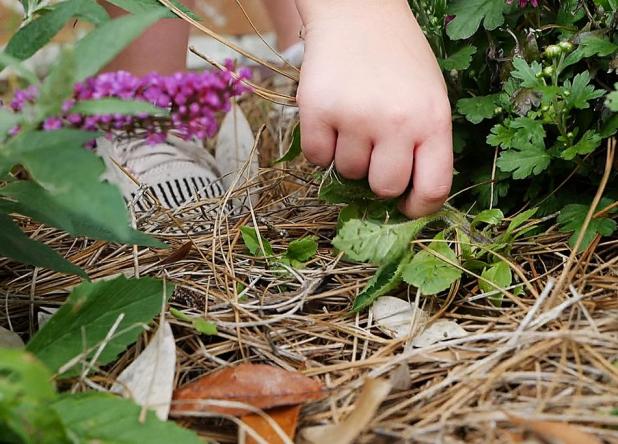
Weeding, pruning and other garden chores can provide physical activity as well as improve the landscape for people of all ages.
—LSU AgCenter/Heather Kirk-Ballard
Get It Growing: Gardening is a good mental, physical distraction
All things seem to revolve around the coronavirus outbreak. Things feel uncertain, surreal and downright scary. Working from home with children or caring for family members can make it a challenge to balance professional demands and family obligations with physical activity and healthy diets.
During this time, it is best to self-isolate and take a great deal of self-care. We also need both mental and physical stimulation to relieve stress and relax.
Gyms are shut down, travel is limited and we must maintain social distance. But you can get the American Heart Association recommended 30 to 60 minutes of moderate intensity aerobic and strengthening activities by gardening. Countless studies have linked regular physical activity with improved joints, increased bone and muscle mass, improved metabolism and immunity to disease as well as enhancing mental health and well-being.
Gardening activities are an excellent source of physical exercise, and vegetable gardens can supply nutritious food. But gardening is so much more than that. It is relaxing; it provides an outlet for stress relief, and it also helps create a sense of belonging and connectedness to others and our planet.
Growing a vegetable garden or tending ornamental gardens and landscapes offer physical activity as well as nutritious, low-calorie foods essential for maintaining a healthy weight. Benefits are not limited to food gardening. They can come from any type of gardening that involves physical activity.
Tasks such as digging, weeding, raking, planting and staking plants are good exercise for both upper and lower body strength and are considered moderate-intensity physical activity, comparable to a brisk walk, swimming and biking.
Other gardening tasks that use upper body strength while standing or squatting — such as pruning, mixing soil, planting seedlings, sowing seeds, watering, filling containers with soil, harvesting and washing produce — are low-intensity physical activities.
Gardening can also contribute to good health by providing fruits and vegetables for proper nutrition. Produce provides an excellent source of fiber, vitamins and minerals essential to our health.
Households that grow their own fresh produce tend to eat more fruits and vegetables. Children who participate in growing produce are also more likely to try or eat a broader selection of vegetables.
In addition to physical and nutritional health benefits, gardening uniquely provides important benefits to mental well-being. The repetitive tasks of gardening can be relaxing and offer mental restoration, stress relief, sense of purpose, forgetting worries and focus recovery. Gardening can also enhance the ability to respond and rebound after difficulties, such as stress or illness. That’s just what we need in this time of uncertainty.
Gardening can meet our need for personal choice and a sense of relationship to our surroundings. Designing a garden space, tackling a garden project, selecting which plants to grow or even choosing flower color are examples of personal choice. A sense of pride and purpose results from growing and harvesting fruits and vegetables or from arranging a vase of cut flowers. And success in the garden leads to an increase in self-esteem.
Plants teach us about patience, delayed gratification (a much-needed skill in this day and age) and nurturing. Gardening tasks also teach us work habits and an understanding of what it takes to produce food and help us observe growth and realize what it means to be needed.
Tending the garden offers valuable focused time for our families to converse, share and interact, supporting feelings of relatedness and belongingness while creating a time for fellowship as well as an opportunity to teach our children about all aspects of our world, life and nature.
Lastly and importantly, the gardens and landscapes we tend offer community and social benefits. When we share tools, offer growing tips or lend a helping hand, we provide support and connectedness in addition to experiencing pride of place and connections to our neighbors.
Growing plants can make our neighborhoods safer places to live. Routinely taking care of plants gets us outside, talking with others and becoming more aware of our neighborhood, resulting in an increased sense of community and stronger social connections.
The plants and gardens that we cultivate matter for our personal health. They enhance our homes, creating a haven for rest and well-being. They provide much-needed exercise, nutrition and diversion while also providing the space to make important community connections.
So get out there. Thankfully, many garden stores are still open. Curbside pickup is available. And as luck would have it in this time of uncertainty, it is spring — a season of rebirth — and life in our landscapes and Louisiana is graced with good weather.
Take some time away from the headlines and busy hustle and bustle of working from home and teaching children. For those still going to work and trying to keep this pandemic in check when you get home, go outdoors. Take time to mentally recover from all the stress by working and being in nature. Bless you all and get out there and get it growing.
